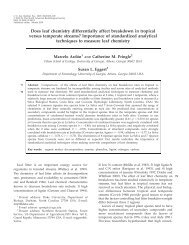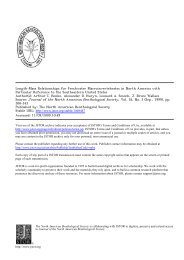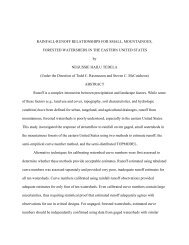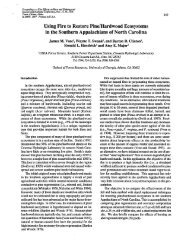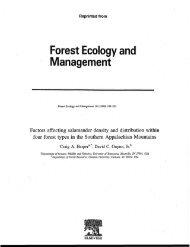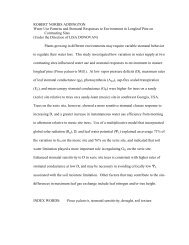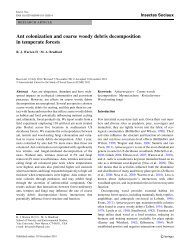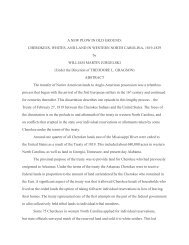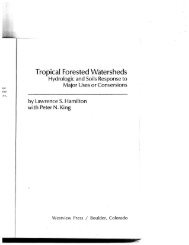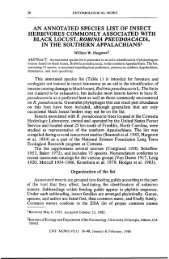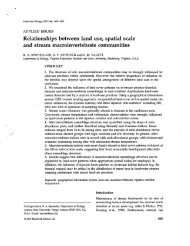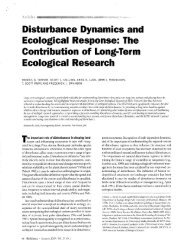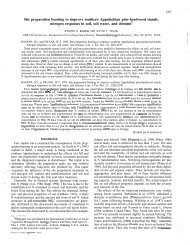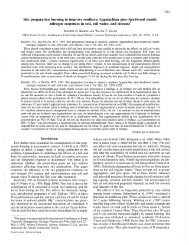biology join - Coweeta LTER - University of Georgia
biology join - Coweeta LTER - University of Georgia
biology join - Coweeta LTER - University of Georgia
Create successful ePaper yourself
Turn your PDF publications into a flip-book with our unique Google optimized e-Paper software.
Articles<br />
and to define a range <strong>of</strong> possibilities and uncertainties in<br />
quantitative and qualitative terms. The value <strong>of</strong> scenario<br />
studies lies in the process <strong>of</strong> embedding alternative states <strong>of</strong><br />
the future into a transparent problem-solving framework<br />
(Swart et al. 2004). In this way, scenario studies may help<br />
to anticipate change in systems characterized by high levels<br />
<strong>of</strong> irreducible uncertainty and low levels <strong>of</strong> controllability<br />
(Bennett et al. 2003, Peterson et al. 2003a) and evoke new<br />
integrative perspectives and novel concepts <strong>of</strong> ecological<br />
change (Carpenter and Folke 2006, Carpenter et al. 2006).<br />
Although environmental scenarios are developed for a wide<br />
range <strong>of</strong> specific purposes, scenario studies can serve three<br />
widely accepted functions: education and public information,<br />
scientific exploration, and decision support and strategic<br />
planning (Alcamo and Henricks 2008, Henrichs et al.<br />
2010).<br />
In many large science- and environmental-assessment<br />
programs, scenarios have been used to describe and underpin<br />
analyses <strong>of</strong> alternative futures. The Intergovernmental<br />
Panel on Climate Change’s (IPCC) emission scenarios<br />
(Naki enovi and Swart 2000) and the Millennium Ecosystem<br />
Assessment’s scenarios (MA 2005) are perhaps the most well<br />
known, but there are many others (e.g., Sala et al. 2000,<br />
Raskin et al. 2005). Several <strong>LTER</strong> sites, for example, are<br />
deeply involved in scenario studies and even more plan to<br />
be. A recent <strong>LTER</strong> Network–sponsored workshop brought<br />
together 32 social and ecological researchers representing<br />
16 <strong>LTER</strong> sites from around the United States that were<br />
actively engaged in some aspect <strong>of</strong> scenario studies for the<br />
region surrounding their sites (Thompson and Foster 2009).<br />
The participants reaffirmed what may seem self-evident:<br />
<strong>LTER</strong>-based science has several characteristics amenable<br />
to developing regional socioecological scenarios. Credible<br />
socioecological scenarios require a deep understanding <strong>of</strong><br />
long-term environmental dynamics—a signature strength<br />
<strong>of</strong> <strong>LTER</strong> science—and a tight coupling <strong>of</strong> ecological and<br />
social research—an emerging strength <strong>of</strong> and direction for<br />
the <strong>LTER</strong> Network (Collins et al. 2011, Robertson et al. 2012<br />
[this issue]).<br />
Looking forward to the next 30 years <strong>of</strong> <strong>LTER</strong>—and,<br />
more generally, to other research programs concerned<br />
with understanding socioecological systems—we argue<br />
that the application <strong>of</strong> scenario studies can advance prescient<br />
thinking in an era <strong>of</strong> unprecedented rates <strong>of</strong> global<br />
change. For example, an overarching goal set forth in the<br />
<strong>LTER</strong> Network’s Strategic and Implementation Plan is to<br />
use its deep understanding <strong>of</strong> complex socioecological systems<br />
to help anticipate ecological, evolutionary, and social<br />
responses to future environmental change and to inform<br />
societal strategies to adapt to this change (<strong>LTER</strong> Network<br />
2011). This aligns seamlessly with the primary functions <strong>of</strong><br />
scenario studies (i.e., underpinning decision processes, collaborative<br />
learning, and scientific exploration). More specifically,<br />
scenarios can enable site-based research programs to<br />
explore possible as well as desirable and sustainable future<br />
states <strong>of</strong> their respective regions. And through sustained<br />
partnerships with land managers, policymakers, and other<br />
stakeholders, participatory scenarios can increase the societal<br />
relevance <strong>of</strong> their research. Moreover, in scenario studies<br />
in which the socioecological future <strong>of</strong> their regions is<br />
formally considered, new research needs can be identified<br />
while research in temporal and spatial dimensions is scaled<br />
up. Finally, developing and analyzing future scenarios<br />
would provide a platform for working with many scientific<br />
networks, including the National Ecological Observatory<br />
Network (NEON) and Urban Long Term Research Areas<br />
(ULTRA).<br />
Driscoll and colleagues (2012) explore the novel ways in<br />
which scientists have delivered their research findings to<br />
policymakers and managers where they can inform decisions.<br />
They describe several important communications<br />
approaches that allow new science to span boundaries and<br />
to address new challenges. In the present article, we examine<br />
scenario studies as one such boundary-spanning approach,<br />
using several examples <strong>of</strong> scenario studies from <strong>LTER</strong> sites<br />
in order to identify approaches that may be more broadly<br />
applicable. More specifically, we evaluate one emerging and<br />
four mature scenario studies in terms <strong>of</strong> three questions that<br />
address the value <strong>of</strong> scenarios for advancing socioecological<br />
science, programs, and outreach:<br />
A science question: How do the scenario studies relate the past to<br />
the future? Related to this question are those <strong>of</strong> what attributes<br />
<strong>of</strong> the socioecological system will change a lot, what<br />
attributes will change a little, and why. To articulate a range<br />
<strong>of</strong> alternative futures in a plausible and credible manner, it is<br />
necessary to understand the relevant history and trajectory<br />
<strong>of</strong> environmental and social change <strong>of</strong> the system <strong>of</strong> interest<br />
and its component parts. Evaluating future scenarios in<br />
light <strong>of</strong> recent changes, then, leads to an understanding <strong>of</strong><br />
system attributes that are more or less resilient or vulnerable<br />
to future change. This feature <strong>of</strong> scenario studies is especially<br />
valuable as socioecological change approaches “tipping<br />
points” and the need to anticipate and mitigate future<br />
change becomes acute (Scheffer et al. 2001, Rockström et al.<br />
2009).<br />
A programmatic question: How do the scenario studies relate to the<br />
more traditional long-term science occurring within <strong>LTER</strong>? Related<br />
to this question is how they can advance science synthesis.<br />
Scenarios take many forms and, as is shown below, they may<br />
have narrow or expansive thematic scope. But in all the case<br />
studies, scenarios are either informed by or are used as a<br />
platform for applying the core long-term research coming<br />
from the individual <strong>LTER</strong> sites. Consequently, scenarios can<br />
be a compelling approach to science synthesis and for crosssite<br />
comparative analyses.<br />
An outreach question: How do the scenario studies affect the<br />
region and regional society through real-world changes or capacity<br />
building? Future scenarios draw together stakeholders<br />
affected by the hypothesized future changes. By engaging<br />
368 BioScience • April 2012 / Vol. 62 No. 4 www.biosciencemag.org



